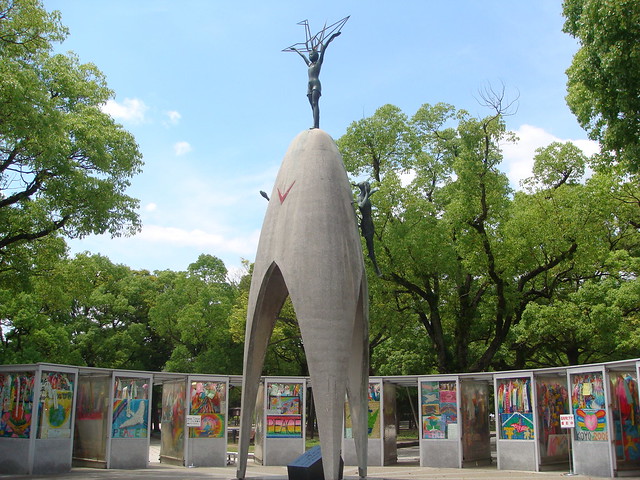神風: Kamikaze
During the Second World War, thousands of young
Japanese men, known as the kamikaze, purposefully crashed their planes into
Allied ships, slowing their attacks. While
the Japanese did, and still do, view these pilots as heroes, brave soldiers who
would do anything for their country, much of the rest of the world sees them as
“a whole generation of Japanese men [who] had been brainwashed into self-abnegation and blind obedience to the Emperor” (BBC). But despite all the
clashes over the nature and motivation of these actions, one fact remains true:
these men willingly sacrificed their lives for their country.
| The kamikaze men, happy that they are about to die for their country. |
You don’t really see that type of devotion in American
soldiers. In fact, in many cases, American soldiers don’t even believe in the
cause that their country is fighting for. In his novel The Things They Carried, Tim O’Brien bemoans that he was “drafted
to fight a war [he] hated” (O’Brien 37). It’s pretty obvious that not everybody
agreed with the wars America has fought, the Vietnam War that O’Brien fought
in being one of the most controversial. However, seeing that America has been fighting in some war for over 90% of its existence (Washington’s Blog), this lack of
commitment and patriotism is, frankly, quite scary.
This creates a spectrum on which Japan is on one side
and America the other. Why is there this drastic difference between the two
countries? Before answering that question, let’s take a step back and look at
the histories of both nations. Japan is a very homogenous society, owing to its
location and historic policy of isolation. No matter where you go in Japan,
everyone more or less looks similar, speaks the same language, and follows the
same traditions. On the other hand, America is the famous “melting pot of the
world.” This does a lot for creating an interesting blend of people and
cultures, but at the same time, it results in many different ideas and
perceptions of how things should be, which often differ greatly from how things
are. This has come up time and time again in America’s history: women
complained about the “repeated injuries and usurpations on the part of man
toward woman” (Declaration of Sentiments), African Americans claimed that “the
character and conduct of [America] never looked blacker to [them] than on [the]
4th of July” (Frederick Douglass), and Native Americans blamed their increasing
problems on assimilation by the white man (Sherman Alexie). It’s not surprising
that Japan, obviously one people with the same culture, one nation with the
same ideals, can band together so easily, while America flounders around still
trying to sort out its own internal problems, while at the same time attempting
to take care of other countries’ problems as well. It's biting off way more
than it can chew.
It’s obvious that America is never going to achieve
homogeneity without whitewashing and assimilating everybody in it. But the
thing is, everybody, without a doubt, would resist said assimilation, and it’s
the least likely thing to happen. The differences and disagreements will never
disappear, because everybody wants to be acknowledged. So does the concept of
“patriotic” exist in America? Maybe not in the most prevalent sense of the
word. Maybe Americans are so loyal to their own in-groups that they cannot be
loyal to America the country. But maybe individuals in America can find the
perfect “balance of aggression and kindness” (Sarah Vowell) and over their
differences, be patriotic to humanity.


2 comments: